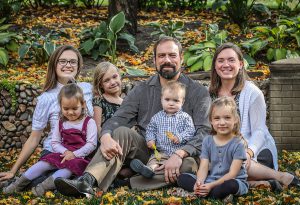
Husband Saying Goodbye To Wife As He Leaves For Work
By Mikaela Pannell
The words “vocation” and “occupation” are sometimes used interchangeably, particularly in the world of work. For example, technical colleges are often called vocational schools. When used in a Catholic setting, however, we find they actually mean very different things.

An occupation is another word for a job or career. Whether it’s spending your summer as a nanny or a lifeguard between semesters or in a career as a doctor or a lawyer, your occupation is what you do for work. A vocation, on the other hand, is your calling from God to the priesthood, religious life or marriage.
In today’s world, it can be easy to fall into the habit of allowing our occupation to overshadow our vocation. In reality, our vocation is the umbrella overarching all other aspects of our lives, including our careers, and is how we are called to best live out our lives as saints in the making.
One woman familiar with this is Sara Hofflander, wife and mother of five. Even at a young age, she recalls watching her own parents putting their vocation first. When Sara was about 8 years old, her mother became a stay-at-home mom, a change that she says “had a big impact” on her. Growing up and discerning what her path in life would be, Sara says God made it very clear she was supposed to be a high school theology teacher.
As it turns out, her occupation choice was actually a step in her vocation journey toward marriage. Sara and her husband, Nathan, met while both teaching at O’Gorman. Starting out as colleagues and then as friends, they started walking along the path of faith together. Sara even became Nathan’s RCIA sponsor. As we were “falling in love with the Church,” she explains, “our paths converged more.”
Eventually, Sara and Nathan’s paths became one in their shared vocation of marriage. For a time, they both continued to teach, but their desire for her to stay home with their children was on their hearts. It required lots of trust in God and asking, “Lord, if this is what you want, then show us how to do it.” And show them he did.
Although they were sad to leave O’Gorman and had to navigate the challenges of adjusting finances and career changes, the Hofflanders have been blessed by their steps in faith and putting their vocation first. Even while being a stay-at-home mom, Sara is a mentor teacher online. This helps to fulfill her love of educating others, and fits well within her role as a wife and mother.
Keeping life directed toward God isn’t easy, but one thing she has realized is that “God is most honored in our trust…He can offer us grace as we go down the path he is calling us to. He will provide everything we need.”

Sara explains that she and her husband are continuing to discern what putting their vocation first looks like for them. Right now, it means she stays home with their kids and participates in teaching avenues other than a full-time position. Down the road, Sara may be back in the classroom setting. Ultimately, the Hofflanders are putting their trust and their future in God’s hands.
Married persons have the unique challenge of prioritizing their relationship with their spouse over other things in their lives. If both members of a marriage have a job, it can be easy to go an entire day (or even longer) without touching base with their spouse, much less giving them a hug or kiss. Couples should establish firm habits that prioritize their relationship with each other and with God. It might be a simple kiss goodbye whenever one leaves the house, or setting aside a weekend every month to get away together. Attending Mass as a couple and afterward discussing moments that stood out is one way to grow in faith together.
Your spouse is also a built-in accountability partner; if you or your spouse’s time and energy is getting consumed by their job, the other person is there to bring them back. Pursuing relationships with like-minded couples is a huge blessing for marriages, as well.
What if you aren’t married or haven’t entered the priesthood or religious life? How can you prioritize a vocation when you aren’t even sure what it is yet?
Brady Martinez is a current Lumen Christi missionary for the Diocese of Sioux Falls and just finished up his first year of college at the University of Nebraska. A lifelong Catholic and member of St. Agnes Parish in Vermillion, Brady was always open to the call to the priesthood; however, it wasn’t until this past year he really felt the pull to discern more intently.
As a full-time college student, it was challenging to balance faith life with everything else happening on a college campus. With classes, a new routine, and all sorts of extracurricular activities, Brady says “it was hard to get a daily prayer routine going…lots of things were grabbing my attention.”
After his first semester, he went on retreat at Broom Tree Retreat Center and constructed a more firm routine that prioritized his faith and prayer life. In particular, he made sure to establish a daily holy hour that Brady “treated like a class” he wouldn’t miss. The discernment process is ongoing, but he is planning to enter the seminary this fall.
Prioritizing your vocation requires a conscious effort. Success in the world’s eyes typically involves making lots of money or finding fame of some kind. This means our jobs tend to get more attention in our daily lives, and our schedules often revolve around them. Many people also find it difficult to completely separate themselves from their careers once they clock out for the day. There always seems to be emails to catch up on, projects with deadlines approaching, and never-ending threads of gossip and workplace drama to take up space in our minds.

It’s very important to be aware of this, and to form habits to keep our priorities aligned with the Lord’s. Brady recommends forming a schedule that has set times for prayer and growing in faith, which he has found allows him to more clearly see how God is working in his life. With so many things competing for his attention, prioritizing his vocation helps him “avoid just doing things to check off the boxes.” This is important for everyone, regardless of which vocation you find yourself in.
The high school and college years of life are good ones to form habits of putting your vocation ahead of your occupation. “Pray every day, weigh the thoughts, feelings, and desires on your heart,” Brady says.
God knows what is best for each of us, and wants us to be joyful and free. It can be hard at times, but in “saying yes to God in every moment…He truly does make me more happy than I could ever make myself.”
It is quite challenging to live a life centered around the Lord. Being surrounded by others who strive for holiness is a great blessing, and seeking out those relationships is a key part of keeping your vocation a top priority. Having support from like-minded friends and family has been crucial for Brady, and it was especially needed during his time of forming his daily habits.
Members of your parish youth group or college Newman Center are wonderful supports to walk along with you in your pursuit of sainthood. For individuals like Brady who are living out the vocation of single life but are discerning a call to the priesthood, religious life or marriage, extra care is needed to prioritize the discernment process. Diocesan Vocations Director Father Jordan Samson can help you navigate that journey.
Taking the time to properly discern and form solid faith habits like attending Mass, reading scripture, and cultivating a healthy prayer life are things you will be able to carry over into whichever vocation you are called to. Oftentimes, maintaining the proper order of priorities in life means having to say no to things, and that’s okay. Picking up an extra shift at work or staying at the library late to study for an exam might seem harmless, but they can easily weigh you down and pull you away from what you’re really called to.
“Healthy boundaries are the way to lead a truly happy life,” Brady says.
Trust in the Lord and willingness to say “yes” to him are essential in living the best life possible. Your vocation sets the path for everything else in life and dictates how you live out your faith. If you set your vocation at the top of your priorities, all the others will fall into place.


